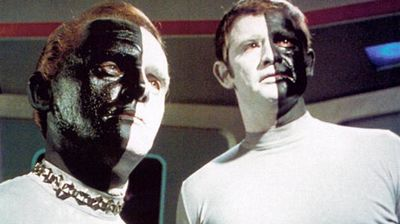elemtilas has an excellent, but somewhat depressing answer:
"Because humans".
That might be true, but one can still wonder what set off the conflict. What were the first two groups to fight?
My suggestion is Crew vs. Colonists. Note: This is not my idea. I am sure read at least one novel or series based on it. Can't name them, though.
In flight, Crew are valuable, Colonists are cargo.
Once they land, Crew are obsolete, Colonists are valuable.
That sudden shift is hard to take for most Crew. They will try to keep in power.
So, why doesn't the Colonists just shrug and move far away? Planets are big.
It turn out that there is one resource that is scarce in the new colony. The ships and their computers. These computers contain lots of valuable information about how to build a colony. And only the Crew can access them.
The Colonists are very knowledgeable about the first generation tasks like making houses and food.
The next tasks, starting mining, smelting and industry was considered less immediate, so the knowledge was shipped in the form of electronic books. That only the Crew can access.
Oh, and they included some weapons in case of dangerous animals. It turns out the only dangerous animal is Homo Sapiens. The Crew controls those weapons.
The Colonists, on the other hand, have numbers on their side.
All in all a classical setup for a noble/peasant society. And since these peasants remember living in a democracy, they are not going to take it. Revolt!
I would expect some Colonists would run away and live in relatively primitive conditions far from the main camp. Others will stand and fight.
Several answers have mentioned that lot can happen in five hundred years. No single civil war is going to last all that time.
You can have many unsuccessful peasant revolts and noble-on-noble wars start, finish and be forgotten by then.
And then there is the successful peasant revolt... Afterwards the revolutionary army moves into the palaces and start living like nobles. Vive la Revolution!
After that, the few remaining Crew nobles ally against the new Colonist nobles to dethrone this "obvious affront to the natural order"
All in all, "Because humans".

